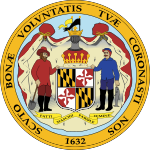| | |||||||||||||||||||||
| |||||||||||||||||||||
| |||||||||||||||||||||
| |||||||||||||||||||||
The 1923 Baltimore mayoral election saw the election of Howard W. Jackson.
| | |||||||||||||||||||||
| |||||||||||||||||||||
| |||||||||||||||||||||
| |||||||||||||||||||||
| Elections in Maryland |
|---|
 |
The 1923 Baltimore mayoral election saw the election of Howard W. Jackson.
The general election was held May 8, 1923. [1]
| Party | Candidate | Votes | % | |
|---|---|---|---|---|
| Democratic | Howard W. Jackson | 74,124 | 45.45% | |
| Republican | William Frederick Broening (incumbent) | 49,919 | 30.61% | |
| Citizens | James H. Preston | 39,042 | 23.94% | |
| Total votes | 163,085 | |||

The 1923 Irish general election to elect the 4th Dáil was held on Monday, 27 August, following the dissolution of the Third Dáil on 9 August 1923. It was the first general election held since the establishment of the Irish Free State on 6 December 1922. The election was held shortly after the end of the Irish Civil War in May 1923. Many of the Republican TDs, who represented the losing anti-Treaty side, were still imprisoned during and after the election and had committed to not participating in the Dáil if elected.

The 1924 United Kingdom general election was held on Wednesday 29 October 1924, as a result of the defeat of the Labour minority government, led by Prime Minister Ramsay MacDonald, in the House of Commons on a motion of no confidence. It was the third general election to be held in less than two years. Parliament was dissolved on 9 October.

The 1923 United Kingdom general election was held on Thursday 6 December 1923. The Conservatives, led by Prime Minister Stanley Baldwin, won the most seats, but Labour, led by Ramsay MacDonald, and H. H. Asquith's reunited Liberal Party gained enough seats to produce a hung parliament. It is the most recent UK general election in which a third party won over 100 seats and the most narrow gap, of a "mere" 100 seats, between the first and third parties since. The Liberals' percentage of the vote, 29.7%, trailed Labour's by only one percentage point and has not been exceeded by a third party at any general election since.
Events from the year 1923 in Ireland.

The 67th United States Congress was a meeting of the legislative branch of the United States federal government, consisting of the United States Senate and the United States House of Representatives. It met in Washington, D.C., from March 4, 1921, to March 4, 1923, during the first two years of Warren Harding's presidency. The apportionment of seats in the House of Representatives was based on the 1910 United States census.

The 68th United States Congress was a meeting of the legislative branch of the United States federal government, consisting of the United States Senate and the United States House of Representatives. It met in Washington, D.C., from March 4, 1923, to March 4, 1925, during the last months of Warren G. Harding's presidency, and the first years of the administration of his successor, Calvin Coolidge. The apportionment of seats in the House of Representatives was based on the 1910 United States census.
National University of Ireland (NUI) is a university constituency in Ireland, which elects three senators to Seanad Éireann, the senate of the Oireachtas. Its electorate is the graduates of the university, which has a number of constituent universities. It previously elected members to the House of Commons of the United Kingdom (1918–1921), to the House of Commons of Southern Ireland (1921) and to Dáil Éireann (1922–1937).
Tipperary was a parliamentary constituency that was represented in Dáil Éireann, the house of representatives of the Oireachtas, from 1923 to 1948 and again from 2016 to 2024. The constituency elected deputies on the system of proportional representation by means of the single transferable vote (PR-STV).
The 6th Philippine Legislature was the meeting of the legislature of the Philippines under the sovereign control of the United States from 1922 to 1925.

An election to the County Council of London took place on 2 March 1922. It was the eleventh triennial election of the whole council. There were sixty dual member constituencies and one four member constituency, making a total of 124 seats. The council was elected by First Past the Post with each elector having two votes in the dual member seats.

Elections were held in the Australian state of Queensland on 12 May 1923 to elect the 72 members of the state's Legislative Assembly. The Labor government was seeking its fourth continuous term in office since the 1915 election; it would be Premier Ted Theodore's second election.

The 1923 Los Angeles mayoral election took place on May 1, 1923. Incumbent George E. Cryer was re-elected over four challengers, which included former Councilman Bert L. Farmer and former Indiana Senator Edward E. Moore.
Elections to Liverpool City Council were held on Saturday 1 November 1924.
Elections to Liverpool City Council were held on 1 November 1923.
Elections to Liverpool City Council were held on Wednesday 1 November 1922.

In the Chicago mayoral election of 1923, Democrat William E. Dever defeated Republican Arthur C. Lueder and Socialist William A. Cunnea. Elections were held on April 3, the same day as aldermanic runoffs.
There were several special elections to the United States House of Representatives in 1923, spanning the 67th United States Congress and 68th United States Congress.

The 1922 Georgia gubernatorial election took place on November 7, 1922, in order to elect the governor of Georgia.

The 1922 Iowa State Senate elections took place as part of the biennial 1922 United States elections. Iowa voters elected state senators in 21 of the state senate's 50 districts. State senators serve four-year terms in the Iowa State Senate.